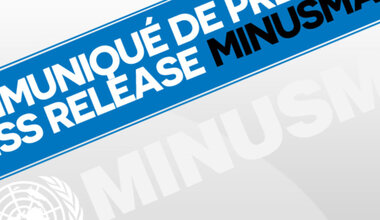Bangladeshi peacekeepers offer hope to villagers in Northern Mali
It’s 6 a.m. at the Bangladeshi military compound in the city of Gao, in the North of Mali. The complex, composed of several tents, is as busy as a bee hive, for in the desert areas the days start much earlier than in the rest of the world.
In front of the logistics tent, the Bangladeshi peacekeepers carefully load tables, chairs, floor mats and medicines into the back of several armored personnel carriers (APC), while nearby, with still-unbuttoned life jackets resting on their shoulders, a team of doctor blue helmets discusses the day’s mission - to patrol to remote villages to create protective presence and deter further hostilities and to deliver medical assistance, as part of civil-military cooperation (CIMIC) activities.

By the time the Malian blazing sun manages to break through Gao’s final layer of foliage, the United Nations Multidimensional Integrated Stabilization Mission in Mali (MINUSMA) convoy is already on the road, deep into the Malian’s part of the Saharan desert. Destination: Battal, a village where no health services exist, and as remote as it can be.
“As a medical professional I have dedicated myself to the service of humanity. Here is the absolute place, since communities are deprived of everything, food, treatment and medicines. I can play a vital role consulting and giving free medications,” said Major Saeed Siddique, 30 years old, serving as a doctor with the Bangladeshi contingent for a year now.
Shortly after takeoff, the visibility went from poor to zero as the harsh desert climate and extreme heat become big challenges. However, the biggest threat are the landmines, always present in the roads in the North of Mali.
The “search and detect” Bangladeshi team is backing up the mission. “Clearing land is a painstakingly slow process, involving serious risks. If you see this road, it is easy for insurgents to hide explosive devices underground to get a better target on us. When we clear it the convoy will resume,” says Major Sadiqur Rahman, as he continues on foot, carefully searching for explosive devices or hiding places for these bombs, along the sandy road leading to Battal.

Delivering basic medical assistance, a challenging endeavor
After a two hours journey, the medical team part of a heavy-armored convoy enters the road of Battal. They are right into the heart of the Saharan desert and are greeted by crowds. The remote village along the Niger River is lined with mud-brick houses, home to 3,500 people.
As usual, peacekeepers bring their equipment to rest under the shade of the few favorably positioned trees. Within minutes, the place turns into a basic medical clinic, with free consultations. A long queue of patients awaits, seating quietly on the ground, on mats, ready to be examined, waiting for their turn, while nurses prepare the prescription orders from the doctor.

Grateful for the peacekeepers continuous security and medical support to his community, the village chief Harour Izietie Gouma, 62 years old, highlights the lack of medical facilities in the area, and the high prices of the medicines.
During the day-long medical campaign, 182 patients have been consulted. “Main diseases are fungal and bacterial infections related to lack of hygiene and sanitation” says Doctor Siddique. “Today, we had a lot of patients with eye problems because of the harsh sandy desert weather. These people are also very malnourished, they do not get enough nutritious food”. The consultations also provide an opportunity to raise awareness about health, hygiene as well as the dangers of improvised explosive devices in the area.
Agaichatou Alkaido, a 58 years old widow, mother of 12 children, says she has been enduring pain in her joints, related to rheumatism, in addition to aches in her bones and muscles. “As an ordinary citizen, I am not able to buy medicines. I received the free medicines that they brought after my medical examination. I hope to recover.”

Women peacekeepers make people talk
Bangladesh is one of the largest contributors to UN peacekeeping operations in the world and the third contributor country to the UN Mission in Mali with some 1,500 personnel, including medical team supporting both peacekeepers and people in remote areas.
The UN mission in Mali distinguishes itself from other UN missions for being ‘the most dangerous active peacekeeping deployment in the world’, with 123 blue helmets killed by hostiles forces and dozens more killed by accidents and illness since its creation.

Sabina Yasmin Tanny, a Bangladeshi Major used to work in challenging environments says that due to cultural reasons, local women cannot be seen talking to men who are strangers, but they can chat freely with female peacekeepers like herself, and in the course of the conversation, slip information about challenges people are facing in their neighborhood. "Outreach is critical," says Sabina. "You go out into the communities, you get a sense of what's going on. Female soldiers in missions have a great role: to help the victims, especially women and children in hard-to-reach areas."
The Bangladeshi peacekeepers are determined to overcome obstacles in order to strengthen efforts to ensure the protection of civiliansto and to reach the people in remote areas in Mali. They are 15,000 miles away from home and families, working for a lasting stability in the country. A job and a call that can, sometimes, be very emotional: “It is very common here, when we treat older patients they use to pray for us, and we become very emotional with them. It is rewarding, and I will remember this memory for life, and if I get this chance again, I will like to continue to serve again and again.”

 UN
UN United Nations Peacekeeping
United Nations Peacekeeping






